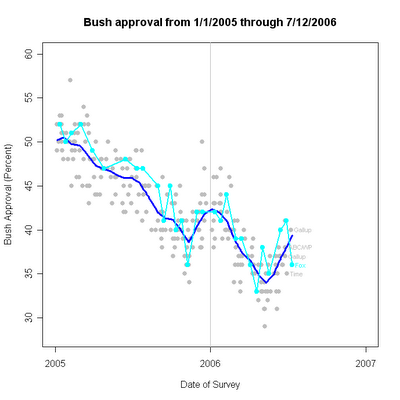
A new Fox poll conducted 7/11-12/06 finds a surprising 5 point drop in approval of President Bush, to 36%, with disapproval at 53%. The drop is quite substantial compared to typical poll-to-poll changes we see and comes in the face of a steady, substantial, and sustained upturn in approval based on all polls incorporated into my approval trend estimate. That trend is revised to 39.4% with the Fox data, down from 40.0% prior to the Fox poll. However, with this revision the trend estimate continues to estimate approval is increasing, though less rapidly than estimated on Tuesday when the latest Gallup poll became available (showing a 40% approval rate.)
Dems were quick to claim that the post-Zarqawi "bounce" is now over if "even Fox" finds approval down. That's a serious misunderstanding of how polls work, and of the dynamics of public opinion. At the same time, we do have to wonder how long the upward trend in approval can be sustained. It is now both longer than, and substantially greater than, the increase we saw in November-January. Then approval recovered only 3.7%. The current estimated increase is now 5.6%. Only during the 2004 election campaign have we seen a sustained upward trend in approval of President Bush. Can this one last?
The Dems are wrong to take this Fox poll as vindication (just as Reps are wrong to take Fox's upticks as vindication.) Both sides have rather studiously ignored polling that goes against them. Let's take a look at the evidence for a moment.
The graph shows that the current Fox downturn is both large and counter to trend, in the Fox poll itself and the blue estimated approval trend line. Does this mean approval cannot have leveled or even started down? No. But at the moment the downturn is counter to other data. Therefore we should treat this result with special caution because it goes against the accumulated weight of other evidence. Second, the shift is SUBSTANTIAL, at a time when there seems to be little ready explanation for such a turn down. Over the past week or two there is no readily discernible event that would "obviously" be a negative for the White House. Indeed, judging from the news of the President's trip to Chicago and Wisconsin, the generally good economic news (granted the budget deficit reduction is a large portion of spin) and the current European trip, there hasn't been much news that would make you think the President should suddenly take a 5 percentage point hit. Especially when the normal movement, EVEN IN BAD times of 2005 was on the order of 1 or 2 percentage points a month. So this large a movement, in the past week's news environment, is not credible.
So there may be movement, but not this large. The much more likely explanation is that Fox got a goodly bit of random variation below the expected value. The poll isn't so discrepant as to qualify as a statistical outlier, but it is still a ways below trend, -4% in fact. So imagine that approval is right where my trend estimate stood before adding Fox: 40.0%. Normal variation around that estimate is +/- 6.5 percentage points. Given that range (observed over five and a half years and 1167 polls) a discrepancy of -4% is small potatoes.
Fox's previous two polls were also noticeably ABOVE trend as well. So even if Fox's latest sampling had simply returned to trend we would have seen some downturn in their approval numbers. I pointed out here then that Fox was about 3 points above trend in their last poll (which was at 41%.)
So before Dems celebrate or Reps sulk, be aware of what poll dynamics are really like. Random draws of +/- 6.5 percentage points around the trend. The trend is what to watch and celebrate or worry about. The random noise around it is a distraction that makes fools of those who try to interpret it. This week's random low will be followed by a random high. If you are serious about political analysis, then you'll ignore that. Don't let the partisan rhetoric cloud your judgment. Your party will be better off if you are a rational analyst than if you are a giddy cheerleader. Both parties have too many of the latter and not enough of the former.
Click here to go to Table of Contents